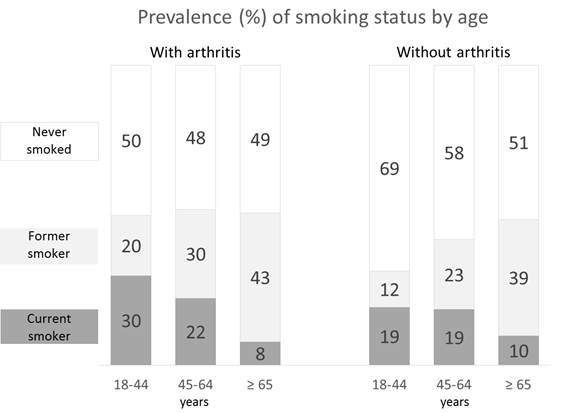Session Information
Session Type: ACR Poster Session C
Session Time: 9:00AM-11:00AM
Background/Purpose: Smoking’s adverse effects include
increased risk of joint replacement failure and decreased medication
effectiveness (e.g., methotrexate, TNF blockers). Because little is known
about the epidemiology of smoking among US adults with arthritis, we examined
prevalence and correlates of smoking.
Methods: We analyzed 2012 and 2013 National
Health Interview Survey data for adults ≥ 18 years. Ever smoked was lifetime smoking ≥ 100
cigarettes; current smokers were “ever smokers” who currently smoked every day
or some days. We estimated overall and age-specific prevalence of smoking
(ever; current) by arthritis status; arthritis was “yes” to “Have you EVER been told by a doctor or other health
professional that you have some form of arthritis, rheumatoid arthritis, gout,
lupus, or fibromyalgia?”. Among people with arthritis, we
examined: 1) current smoking prevalence across socio-demographic
characteristics, health status, and health behaviors; 2) associations between
these characteristics and current smoking using prevalence ratios (PR) and 95%
confidence intervals from multivariable logistic regression models.
Results: Ever smoking prevalence was higher
among US adults with arthritis (51%) than those without (37%) overall and
across all age groups (statistically significant [α=0.05])(Figure).
Overall current smoking prevalence was the same for those with and without
arthritis (18%); however, among young (18-44 years) and middle age (45-64
years) adults, current smoking prevalence was higher among those with arthritis
than those without (statistically significant [α=0.05])(Figure).
Among adults with arthritis, current smoking prevalence was at least 25% among
those with the following characteristics: high (39%) or moderate (25%) serious
psychological distress; unable to work because of disability (34%); young
adults (30%); ≥ 2 types of non-arthritis pain (26%); or chronic pulmonary
condition diagnosis (25%). In multivariable models, age and education were
strongest correlates of current smoking: PRs for current smoking declined with
increasing age (18-44=3.0; 45-64=2.3; referent: ≥ 65) and education (<
high school=2.9, high school=2.5, and some college=2.1; referent: college
degree).
Conclusion: Current smoking is a serious
clinical and public health issue among adults with arthritis, especially young
adults. By recommending effective and evidence-based tobacco cessation
strategies, health care providers may improve treatment effectiveness.
To cite this abstract in AMA style:
Murphy L, Cisternas MG, Brady TJ. Current and Lifetime Smoking Among US Adults with Arthritis: A Serious Clinical and Public Health Issue [abstract]. Arthritis Rheumatol. 2015; 67 (suppl 10). https://acrabstracts.org/abstract/current-and-lifetime-smoking-among-us-adults-with-arthritis-a-serious-clinical-and-public-health-issue/. Accessed .« Back to 2015 ACR/ARHP Annual Meeting
ACR Meeting Abstracts - https://acrabstracts.org/abstract/current-and-lifetime-smoking-among-us-adults-with-arthritis-a-serious-clinical-and-public-health-issue/

